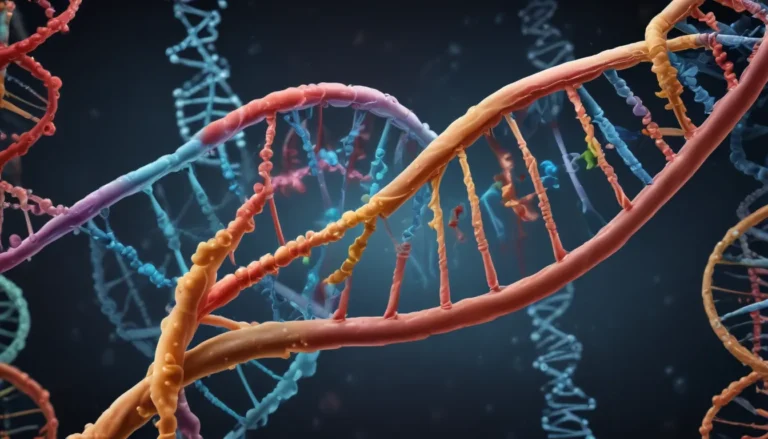A Note About Images: The images used in our articles are for illustration purposes only and may not exactly match the content. They are meant to engage readers, but the text should be relied upon for accurate information.
In recent years, immunotherapy has emerged as a revolutionary approach to treating various diseases, offering new hope and possibilities for patients. This groundbreaking field harnesses the body’s immune system to combat illnesses such as cancer and autoimmune disorders, with remarkable success rates and fewer side effects than traditional treatments like chemotherapy and radiation therapy. However, despite its increasing popularity, the enigmatic nature of immunotherapy leaves many intrigued and curious about its potential.
The Power of Immunotherapy
Immunotherapy, also known as biologic therapy, is a cutting-edge cancer treatment that utilizes the body’s immune system to target and destroy cancer cells. Unlike traditional therapies, which often come with significant side effects, immunotherapy works by activating the body’s natural defense mechanisms to specifically attack cancer cells without harming healthy tissues. This innovative approach has shown incredible promise in enhancing long-term remission and improving patient outcomes.
Understanding How Immunotherapy Works
Immunotherapy functions by stimulating the immune system to recognize and attack cancer cells through various mechanisms. It can involve boosting immune cell activity, blocking proteins that suppress the immune response, or using genetically modified immune cells to target cancer cells specifically. By activating the body’s immune response, immunotherapy offers a personalized treatment option that can be tailored to individual cancer types and genetic makeup.
Success Stories of Immunotherapy
Immunotherapy has demonstrated remarkable success in treating certain types of cancer, including melanoma, lung cancer, bladder cancer, and Hodgkin lymphoma. In some cases, it has significantly extended survival rates and led to long-term remission and even cure. The ability of immunotherapy to yield durable responses and improve patient outcomes has made it a transformative approach in the fight against cancer.
Lessening Side Effects with Immunotherapy
Compared to traditional treatments like chemotherapy and radiation therapy, immunotherapy tends to have fewer side effects. While common side effects may include fatigue, flu-like symptoms, and skin reactions, they are generally milder and more tolerable. It is important to note that individual experiences with immunotherapy can vary, and close monitoring by healthcare providers is crucial to manage any potential side effects effectively.
Enhancing Treatment with Combination Therapy
Researchers are increasingly exploring the benefits of combining different types of immunotherapy or integrating immunotherapy with other treatment modalities such as chemotherapy or targeted therapy. This combination approach has shown potential in improving treatment effectiveness and overall outcomes for patients with various types of cancer.
Personalized Medicine through Immunotherapy
One of the hallmarks of immunotherapy is its personalized treatment approach, which considers factors such as cancer type, stage, and genetic characteristics. By tailoring treatment plans to individual patient profiles, immunotherapy offers a targeted and effective strategy that increases the likelihood of successful outcomes while minimizing unnecessary side effects.
Pioneering Advances in Immunotherapy Research
The field of immunotherapy is continuously evolving, with ongoing research efforts focused on developing new techniques to enhance treatment outcomes and expand the range of cancers that can be effectively addressed. By unraveling the full potential of immunotherapy, scientists aim to revolutionize cancer care and pave the way for more effective and personalized therapies.
Long-Term Protection with Immunotherapy
Immunotherapy has the potential to train the immune system for long-term protection against cancer recurrence. Through generating a sustained immune response, immunotherapy offers patients the prospect of lasting remission and continued protection against disease progression. This characteristic highlights the exciting possibilities of immunotherapy in achieving durable responses.
Exploring Immunotherapy Beyond Cancer
While immunotherapy is most commonly associated with cancer treatment, its applications extend to other medical conditions such as autoimmune diseases like rheumatoid arthritis, multiple sclerosis, and Crohn’s disease. The versatility of immunotherapy in modulating the immune system opens up new avenues for exploring its potential benefits across a broad spectrum of illnesses.
New Horizons for Immunotherapy
Immunotherapy presents new hope for individuals with previously untreatable cancers, offering innovative solutions where traditional treatments have fallen short. By reprogramming the immune system to recognize and combat cancer cells, immunotherapy has introduced novel treatment possibilities that hold promise for patients facing challenging diagnoses.
The Future of Immunotherapy
In conclusion, immunotherapy represents a captivating frontier in modern medicine, with the potential to transform the landscape of disease treatment. From its origins to its current advancements, immunotherapy has shown significant progress in extending patient lives and improving treatment outcomes. While there is still much to learn about this field, ongoing research and clinical trials continue to unveil new discoveries and refine treatment strategies, bringing us closer to more effective and personalized therapies.
Unveiling the Mysteries of Immunotherapy
Immerse yourself in the groundbreaking work of immunotherapy pioneer Dr. Tal Zaks, whose contributions have shaped the field and propelled it towards new heights. Discover the intricate world of tumor immunology, where the complex interactions between the immune system and cancer cells hold the key to unlocking innovative treatments. Be inspired by the remarkable accomplishments of Dr. Carl June, a visionary scientist whose cutting-edge research has revolutionized patient care and outcomes.
FAQs: Navigating the World of Immunotherapy
-
What is immunotherapy? Immunotherapy is a treatment approach that utilizes the body’s immune system to combat diseases, particularly cancer, by targeting and eliminating abnormal cells.
-
How does immunotherapy work? Immunotherapy functions by stimulating the immune response or by directly targeting cancer cells using specific molecules, such as immune checkpoint inhibitors or adoptive cell transfer.
-
What diseases can be treated with immunotherapy? Immunotherapy has shown promise in treating various cancers, including melanoma, lung cancer, and bladder cancer, as well as autoimmune disorders and infectious diseases.
-
What are the side effects of immunotherapy? Side effects of immunotherapy can vary from mild to severe and may include fatigue, skin reactions, flu-like symptoms, and organ inflammation, depending on the treatment approach.
-
Is immunotherapy a standalone treatment? Immunotherapy is often combined with other therapies like chemotherapy, radiation therapy, or surgery to optimize treatment outcomes based on individual patient needs and disease characteristics.
-
Who is a suitable candidate for immunotherapy? The effectiveness of immunotherapy as a treatment depends on factors such as the type and stage of the disease and the patient’s overall health, and suitability is determined on a case-by-case basis.
-
What advancements are happening in immunotherapy? Immunotherapy is a rapidly evolving field, with ongoing research focused on developing new drugs, treatment strategies, and clinical trials to improve effectiveness and expand applications.
-
How long does immunotherapy treatment last? The duration of immunotherapy treatment varies based on the disease, treatment response, and patient health status; some patients may receive treatment for a few months, while others may require ongoing or maintenance therapy.
As you delve into the intriguing world of immunotherapy, remember that each discovery and advancement brings us closer to more targeted, effective, and personalized treatments. By exploring the mysteries of immunotherapy, we pave the way for a brighter future in healthcare, where innovative therapies offer hope and healing to those in need. Trust in the journey of science and discovery as we unlock the potential of immunotherapy and its transformative impact on the world of medicine.






